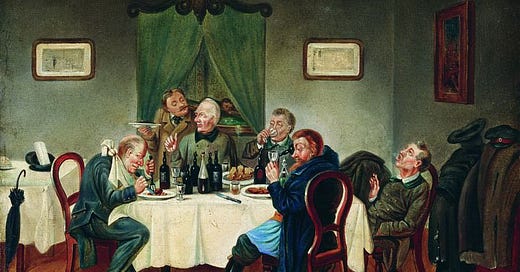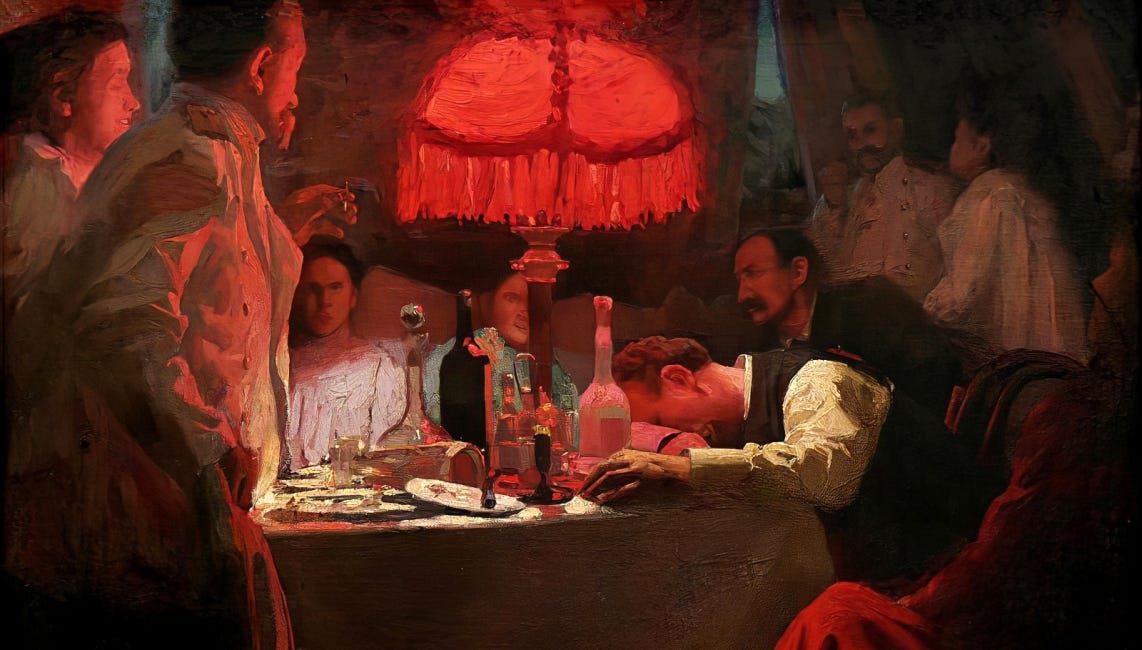First off, people of most (if not all) cultures drink; Russians are not unique in this. There are universal reasons for people of the world to consume alcohol. If you look at figures of annual alcohol consumption by country, Russia does not top the list. Consumption of alcohol in other countries (many of which are smaller than Russia) is much higher. Why then is one of the most widespread notions about Russia that Russians drink a lot?
I am not going to dive into the history of drinking in Russia. Enough to say that drinking is and has always been a big part of Russian culture. Although many Russians nowadays pursue a healthier mode of life, drinking holds its place in the lifestyle of an average Russian. Bars are still there, and they grow in number. Cafes and restaurants make a substantial chunk of their revenues selling drinks. Each food store has a large alcohol section stocking hundreds of varieties of alcohol. Those alcohol businesses keep developing and increasing sales for a reason — people drink. Albeit with some restrictions on selling and taxes, alcohol is relatively cheap and easily accessible in Russia. The legal age in Russia is 18, and it's strictly enforced. It is not unusual to be asked for an ID at the store checkout for the cashier to ensure your age.
However, statistics of the past years say consumption of alcohol in Russia goes down. One thing it indicates, people choose milder alcohol over vodkas (as well as other strong alcohol), such as beer and wine. Vodka still is a big thing here, but having a choice, many Russians opt for different varieties of drinks. In the past years, Russia had an explosion of craft beer production. Beer joints pop up here and there every month. Beer culture is on the rise with new products, recipes, tastes, and technologies. The local wine industry tries to take off too, to no avail so far, as it needs more time, and as of now, Russian winemakers lose to imported brands.
Drinking in Russia is a part of a lifestyle that has been developing for centuries and is rich in rituals and traditions. The drinking culture in Russia is well-established, making alcohol consumption a sophisticated and civilized process. Alcohol consumption customs stem from history and cultural roots and serve particular culture-driven purposes. That being said, Russians are not brainless sloppy drunks as often portrayed by people not familiar with Russian culture — this image simply is not fair. Drinking in Russia has meaning beyond just getting drunk. Let's dive into the core of Russian culture to understand how it works.
In Russian culture, alcohol is a shortcut for establishing connections and building relationships.
One of the most prominent values of Russian culture is personal relationships. Relationships in Russian culture are a big subject on their own. Suffice it to say, relationships and connections work as prerequisites for any type of interpersonal dealings to be open, meaningful, trustworthy, and fruitful. That applies to all areas of life: family, business, public affairs, and so on.
Relationships don't come easy, as Russians do not trust those they don't know well. Russians are cautious of potential harms (real or imaginable) strangers may bring. To protect themselves from untrustworthy people, Russians put on a so-called "protective shell." It's a type of behavior intended to demonstrate their might, so they can not be taken advantage of. You have probably heard about the so-called "toughness" of Russians. "Tough Russian" — a cliche image of sorts. This toughness is nothing but a made-up image people demonstrate to others—we are strong and not that vulnerable.
For building trust relationships, those protective shells have to come off. In ordinary life, Russians achieve that through socializing, which takes effort and time. Alcohol melts those protective shells quicker, making people more open, less suspicious, more accepting of others, and more trusting. In this way, drinking serves as a shortcut for building relationships.
Russian proverb says: "Что у трезвого на уме, у пьяного на языке [Chto u trezvogo na ume, to u pyanogo na yazike]". Very roughly translated, the saying means: "What the sober person has in mind, the drunk person speaks." People open up under the influence of alcohol. Otherwise, achieving the same level of openness would have needed a much longer time.
With Russians, "Let's have a drink" ["Davai vipyem"] in essence means "Let's get to know each other better." For Russians, connecting with the other person requires a profound knowledge of their personality, lifestyle, values, and views on things. Trust relationships are genuinely meaningful in Russian culture; they can not be shallow. Alcohol opens up people faster, relaxes, enables talkativeness. Bonding under the influence of liquor happens quicker and more efficiently. Drinking with someone requires a certain level of openness, intimacy, trust, and expresses a deliberate willingness to connect. Drinking in Russia is a social ritual for bonding, establishing open, sincere, trustworthy connections.
If you refuse to drink with someone in Russia, that implies disrespect and unwillingness to bond. Rejecting the drink sends the subliminal message: "You are not good enough for me to bond with you" or "I don't like you and don't want to socialize with you." Refusal to drink with someone equals a rejection of whoever offers the drink. It triggers a typical reaction, expressed in a cliche phrase: "Ты меня уважаешь? [Ty menya uvazhaesh?]", translates as: "Do you respect me?"
Therefore drinking, in Russian culture, is an act of bonding. But there is more to drinking in Russian culture than just that. In the next part, we will talk about drinking as an act of communal union.
Part two:





Na zdorovie!